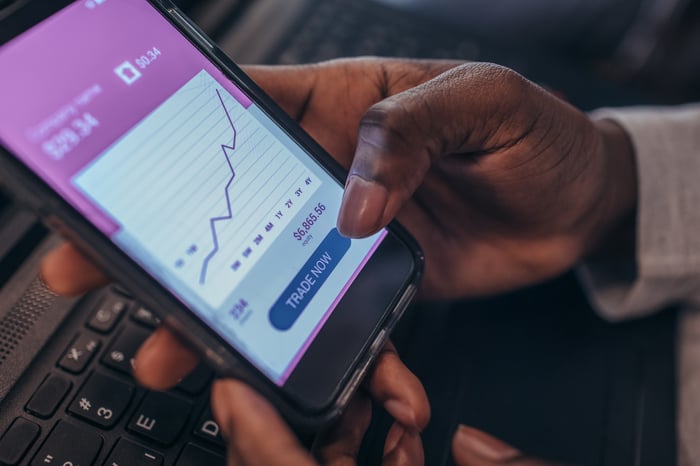Cathie Wood's ARK Invest shows a history of risky, high-value technology bets, and many of her moves seem drawn straight from the user-generated pages of Reddit. " It was largely the Reddit trading community that spurred the market onward in early 2021, driving up so-called "meme stocks," such as GameStop (GME 0.50%) and AMC Theaters (AMC -2.44%). Two ARK Invest EFTs picked up over $14 million in Robinhood (HOOD -1.33%), with major purchases in November -- and like many Cathie Wood moves, it could be a smart if exceptionally risky investment choice.
Maybe Cathie Wood and her crew are banking on Robinhood hitting an all-time low before recovering, or maybe just the anniversary of the events such as the "meme stock" revolution could drive up speculation of a second round in the media and spur on those same Reddit trading communities. If any one of these possibilities pans out, savvy traders could benefit from snapping up shares at the current low prices.

Image Source: Getty Images
Would you do what Cathie Wood would?
The case against such an investment seems clear. Robinhood launched its IPO even as its own users were suing the company for clamping down on market volatility by preventing them from trading certain super-popular "meme stocks." The mania that had struck "meme stock" investors in the first half of the year also cooled significantly during that period. By its first earnings report, Robinhood faced pre-tax losses of $1.37 billion and relatively slower revenue growth of 35% year over year, as opposed to its stellar 514% growth in 2020. The same quarter in the previous year, Robinhood lost only $11 million, and the company ended that year with a profit of $58 million. Analyst Atlantic Equities downgraded Robinhood to neutral from buy in mid-November, arguing that the company still needs to show positive cash flow and some semblance of stability.
Robinhood's shares and reputation took such a hit in part because of one of the key ways it makes money. The Wall Street businesses that do the actual share buying and selling for companies like Robinhood and their users -- the processors of those transactions -- want to know who's buying or selling what on the market at any given time. That way, they can take advantage of market moves to make a little extra money for themselves before they actually carry out their customers' orders. In return for that sneak peek into users' activity, processors give Robinhood and other companies a rebate on the transaction fees that processors charge to make those sales and purchases -- letting Robinhood and its users make trades without paying extra commissions on them.
This practice, called payment for order flow, creates a potential conflict of interest since both Robinhood and processors are putting their own profits first at their customers' potential expense. The SEC began investigating this practice, which most other English-speaking markets prohibit, and has not ruled out banning it. The bad press and potential lost revenue that this investigation brought, coupled with Robinhood's user-angering crackdown on mass meme-stock trading, drove users away in record numbers by the time of the IPO and contributed to Robinhood's steady share decline over the year.
Could the perfect storm return?
Courts have already dismissed most of the user lawsuits against Robinhood, finding no evidence that the company conspired to hurt investors or the companies they wanted to trade. Since Robinhood was simply imposing the kind of trading curbs required by law, future such suits seem unlikely. That relieves a lot of the burden that could otherwise continue to drive down stock value.
The company may have a favorable wind at its back as well. During the market's run-up in the first part of 2021, would-be investors got excited and signed on to Robinhood in droves. The pandemic led many first-time investors with disposable income to stay at home and discover no-fee retail trading, and forums like Reddit's r/WallStreetBets organized those traders into a meaningful bloc around the so-called "meme stocks."
This perfect storm still had one element missing: Investors couldn't bet on the platform that benefited so much from the situation. Robinhood itself wasn't public; now it is. The company successfully sold $3.4 billion in new shares to interested investors during last year's GameStop squeeze.
The pandemic doesn't seem to be going away anytime soon. If another major event drives people back to the retail platform, ARK Invest would be in an excellent position to capitalize on it, just as workers begin to receive federal income tax refund checks. The mere speculation that such an event might happen, coupled with media hype surrounding the anniversaries of 2021's big moves, may be all that Robinhood needs to revive a retail investor frenzy.
If nothing else, ARK Invest apparently considers this a good time to get a low price on Robinhood stock. It has a history of buying tech stocks at annual lows to benefit from the potential recovery thereafter, as it did upon the announcement that Jack Dorsey was stepping down as Twitter's CEO. Perhaps Cathie Wood feels the stock has been beaten down enough. The initial strengths of a user-friendly, fee-free trading app and an army of novice investors haven't changed. The relief of the perceived risk due to the dismissal of lawsuits and all-time low pricing may be reason enough for ARK to make its move.
If you're willing to take the risk, you might just follow in Cathie Wood's footsteps and snag some shares on the cheap before the media starts reminding everyone about last year's trips "to the moon" and a new crop of novice investors potentially hops on the hype train after the holidays.




